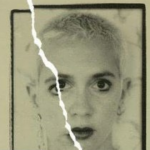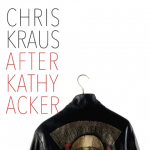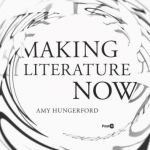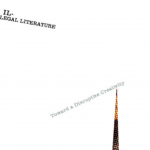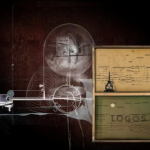2018
Even as the first biography of Kathy Acker appears, we have word of a newly assembled Acker archive in Cologne, under the curatorship of Daniel Schulz. The gist of which, could be to re-orient Acker's personal relationships to "the politics inherent in Acker's life."
Ralph Clare reviews After Kathy Acker: A Literary Biography by Chris Kraus.
Berry, who with ebr editor Joseph Tabbi initiated the Fictions Present thread (circa 2006), finds few intersections of that project with Hungerford’s celebrated Making Literature Now, not least because Hungerford shows little interest in the question of how her titular concept, when applied to commercial and cultural productions, indie and alt endeavors, “manages to mean what those trying to make literature are trying to make.”
2017
ebr Associate Editor Lai-Tze FAN responds to Dani Spinosa's review of *llegal Literature: Toward a Disruptive Creativity,*by David S. Roh.
Dani Spinosa reviews David S. Roh's Illegal Literature a book about authorship, copyright, fair use and literary disruptions.
In this review of O'Nan's West of Sunset, Messenger explores 20th Century American literary history as a kind of contemporary metafictional myth. Using Scott and Zelda Fitzgerald as characters composing the life of a literary icon against the emergence of "Hollywood," O'Nan's work is considered a bittersweet meditation on the death of an author and the hope that his work lives on.
In this review of Rethinking the New Medievalism, Matt Cohen ponders the significance of philology's ongoing period of "reflection, [...] refraction, and revisitation." Against the backdrop of contemporary shifts in the humanities, more generally, Cohen sees opportunities for medievalists to intervene, bringing with them both clarity and innovation to fields in a state of fluctuation.
2016
Andrew Lindquist reviews Michael LeMahieu's Fictions of Fact and Value, examining the influence of logical positivism on American literature of the postwar era.
Afterthoughts on the end of the sixties, the death of the author, the rise of Theory and the fall of humanism.
In reviewing James McFarland’s Constellation, Donald Cross reminds readers of the rich potential of scholarly discourse. Beyond mere citations and their absence, Cross traces across the bright stars of Nietzsche and Benjamin (and Derrida) relationships worthy of serious consideration. In an age of copy/paste citations, impact reports, and optimized academics, pondering the constellations offers an opportunity to rediscover the subtle intensity of tracing forms in the void.
In his review of Martin Paul Eve’s Pynchon and Philosophy: Wittgenstein, Foucault and Adorno, Julius Greve situates this new book on Pynchon within the upheavals produced by speculative realism and contemporary discourses on materialism. In doing so, Greve reminds us of what was always already the case: the literary-philosophical relevance of Pynchon, which turns out to be all the more inescapable in contemporary political climates.
Originally publication: The Schofield, Issue 1.1 - David Markson & Solitude - Summer 2015 (page 13). Reprinted with permission.
In this analytical, unabashedly philosophical engagement with Alex Galloway's "sneakily-titled" Laruelle Against the Digital, Martin Eve sides with the skeptics for whom "Laruelle proves a better diagnostician of epistemic illness than he is prescriber of a cure."
2015
McKenzie Wark explores the work of Masha Tupitsyn as a pathway into the conditions of life in the 21st Century, somewhere above (or below) the framework of mediated experience, even beyond the limits of what we often call "theory." With Tupitsyn, Wark troubles the current stasis of representation that stultifies thought in this age of unrepentantly industrialized culture, not by turning us away from the spectacle, but by smashing right through it, picking up its pieces, and discovering new things in the wreckage.
Joyce’s treatment of baseball in Going the Distance isn’t merely thematic, according to Punday, who believes that baseball (and its emphasis on numerical ordering) here represents the balance of the poetic and computational that defines Joyce’s electronic literature.
Steve Tomasula discusses the development and context of his work (and TOC in particular), including relations to print and electronic literature, in this interview with Kiki Benzon.
By working through the resemblances between Tomasula's Vas: An Opera in Flatland (2004) and Edward Abbott's much earlier Flatland (1884), Pham-Thanh establishes how Tomasula "orchestrates the downfall of the traditional hegemonic masculinity" that defined Abbott's time.
Ciccoricco acknowledges that Michael Joyce's new novel (Foucault, in Winter, in the Linnaeus Garden), which gives a fictionalized account of Foucualt's relationship to Jean Barraque, opens Joyce up to a broader range of criticisms, though Ciccoricco also argues that by focusing on a "productive and troubled time for Foucault," Joyce ultimately offers a "compelling meditation on what we might call the nexus of madness, philosophy, and literature."
2014
Vanwesenbeeck situates Mark Taylor’s recent Rewiring the Real, within a growing body of critical literature (which also includes John McClure’s Partial Faiths and Amy Hungerford’s Postmodern Belief) that regards religion as key to a robust account of postmodern culture—and for Taylor, in particular, as key to appreciating the novels of William Gaddis, Richard Powers, Mark Danielewski, and Don DeLillo
In “…without shame or concern for etymology,” Hanjo Berressem discusses Pynchon's Bleeding Edge in the context of post-9/11 fiction. In contrast to narratives of post-traumatic melancholy, Berressem argues that Bleeding Edge is a “Jeremiad about the fall and the sins of America.” The result is an essay that makes a powerful case for Pynchon as a prophetic, if brutal, witness to American society turning towards security and control in the shadow of tragedy.
